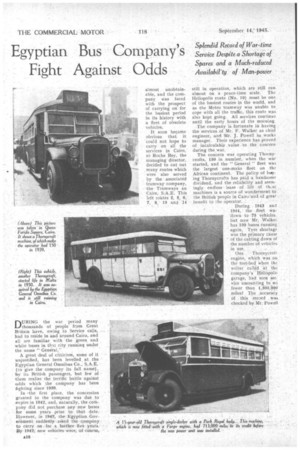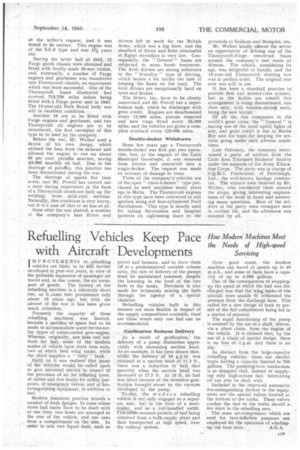Egyptian Bus Company's Fight Against Odds
Page 20

Page 21

If you've noticed an error in this article please click here to report it so we can fix it.
DURING the war .period many thousands of people from Great Britain have, owing to Service calls, had to reside in and around Cairo, and all are familiar with the green and white buses in that city running under the name " Genital," A great deal of criticism, some of it uttjustifiecl, has been levelled. at the Egyptian General Omnibus Co., S,A.E. (to give the company its full name), by its, British passengers, but few of them realize the terrific battle against odds which the company has been fighting since 1939.
In -the first place, the concession granted to the company was due to ,expire in 1942, and, naturally, the company did not purchase any new buses for some years prior to that date.. However, in 1942, the Egyptian Gov. erhmertt suddenly asked the .company. to carry on for a further .five years. By 1942; new vehicles wete, of coUrse, almost unobtainable, and the company was faced with the prospect of carrying on for the busiest period in its history with a fleet of obsolete vehicles.
It soon became obvious that it could not hope to carry on all the services in Cairo, so Roche Bey, the managing director. decided to cut out many routes which were also served by the associated tramway company, the Tramways an Caire, S.A.E. This left robtes 2, 5, 6, 7, 8, 10 and 14
still in operation, which are still run. almoston a peace-time scale. The Heliopolis route (No. 10) must be one of the busiest routes in the world, and as the Metro tramway was unable to cope with all the traffic, this route was also kept going. All services continue until the early hours of the morning.
The company is fortunate in having the services of Mr. F. Walker as chief engineer, and Mr. J. Powell as works manager. Their experience has proved. of incalculable value to the concern during the war.
The concern was operating Thornycrofts, 150 in number, when the war started, and the " General " fleet was the largest one-make fleet on tin.. African continent. The policy. of Envying Thornycrofts has paid a handsome dividend, and the reliability and seemingly endless lease of life of th,se machines is a source of wonderment to the British people in Cairo and of great _benefit to the operator.
During 1943 and 1941, the fleet wa."down to 75 vehicles. but now Mr. Walket has 100 buses running again.. Tyre shortage was the primary cause of the cutting down of the number of vehicles in use.
• One Thornycroft engine, %stitch stras on the test-bed When the writer called it the company's Heliopolis garage, had seen Service amounting tno fewer than 1,300,600 . , miles! The accuracy of this •record was checked by Mr. Powell
at the writer's request, and it was folind to be correct. This engine was of the S.C.6 type and .was I7i years
During the latter half of 1942, 12 Fargo goods chassis were obtained and fitted with locally made 26-seat bodies, and, eventually, a number of Fargo engines and gearboxes was, transferred into Thornycroft chassis, an experiment which was most successful, One of the • Thornycroft buses illustrated had covered 713,720 miles before being fitted with a Fargo power unit in 1945. The I5-year-old Park Royal body was still in excellent condition.
Another 16 are to be 'fitted with Fargo engines and gearboxes, and two Thornycroft oil engines are to be introduced, the first examples of this type to lie used by the company.
Before the war, Mr. Walker used a device of his own design, which utilized the heat from the exhaust and .allowed the engine to ran on about SO per cent< paraffin mixture, saving £3,000 monthly on fuel. Due to the shortage of paraffin, this practice has been discontinued during the war.
The shortage of spares has been acute, and Mr. Powell has carried out a most daring experiment in the form of•a Thornycroft crankcase built up (by welding) from mild-steel sections. Naturally, this crankcase is very heavy, • but it is a case of that or no bus at all. Soon after the 'war started, a number of the company's best fitters and drivers left to work for the British Army, yvhich was a big blow, and the standard of driver and fitter obtainable in Egypt nowadays is very low. Consequently, the " General " buses are subjected to some harsh treatment. The Arab drivers are strong adherents to the " brutality" type of driving, which "makes a lot harder the task of keeping the buses on the road. The local drivers are exceptionally hard on tyres and brakes.
The fitters, too, have to be closely supervised, and Mr. Powell has a superhuman task, which he discharges with great credit. Engines are decarbonized every 12,000 miles, pistons removed and new rings fitted every 25,000 miles, and the vehicles are given a complete overhaul every 125,000 miles.
Double-decker Withdrawn Some few years ago a Thornycroft double-decker was first put into operation, but, at the request of the Cairo Municipal Governate, it was removed from service and converted into a single-decker. The request was made on account of damage to trees.
Three of the company's vehicles are of the open " chars-a-bancs " type purchased as used machines many years ago in Malta. The Thornycroft engines in this type have been convertedto coil ignition using old four-cylindered Ford distributors. 'This type is mostly used for taking Servicemen and hospital patients on sightseeing tours to the pyramids at Sakkara and Memphis, etc.
Mr. Walker kindly offered the writer an opportunity of driving one of the Thornycroft-Fargo converted buses around the company's test •route ,at Almaza. The vehicle, considering its age, was delightful to handle, and the 15-year-old Thornycroft steering box was in perfect order. The original rear axle was still in use.
It has been a standard practice to' provide first and second-class saloons, but as the bodies are rebuilt this • arrangement is being discontinued, One class only, with wooden-sLatteil seats, being the new layout " Of all the bus companies in the world's great cities, 'the "'General is ,having one of the most uphill fights of any, and great credit is due to Roche Bey and his team for keeping the services going under such 'adverse conditions.
• Last February, the company entertained a party of soldiers from the Cairo Area Transport Students' Society under the auspices of the Army Education Corps. The party was in charge of S.Q.M.S. Fishbourne, of Fairelough, Ltd., the well-known haulage contractor. The visitors were received by Mr. Walker, who conducted them around the shops, giving interesting explanations of the work in hand and answering many questions. Most of the soldiers in the party were transport men in civilian life, and the afternoon was , enjoyed by all.




















































